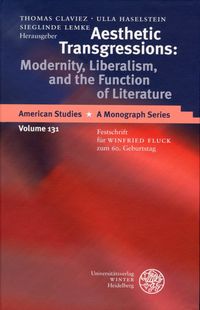
Aesthetic Transgressions: Modernity, Liberalism, and the Function of Literature
Festschrift für Winfried Fluck zum 60. Geburtstag
1. Auflage, 2006
384 Seiten
ISBN: 978-3-8253-5197-7
Sortiment: Buch
Ausgabe: Gebunden
Fachgebiet: Anglistik/Amerikanistik
Reihe: American Studies – A Monograph Series, Band: 131
lieferbar: 11.04.2006
Schlagwörter:
Literatur, Ästhetik, Moderne, USA, Aufsatzsammlung, amerikanische Literaturwissenschaft, Lang, Fritz, Hawthorne, Nathaniel, Williams, William Carlos
The debate over the function of aesthetics can be traced back to the New Criticism and its aftermath. After its theoretical axioms and criteria of judgement had been debunked as ideologically charged, two factions emerged. A number of critics defended the value of aesthetic complexity, i.e. of ambiguity, irony and negativity, and refused to accept the arguments of ideology critique attacking the concept of aesthetic autonomy. Revisionist critics, however, tended to marginalized aesthetic categories, or rather, they described the respective textual features as complicity with the social status quo, and concentrated on art previously omitted from critical study because of its political or social agenda. Today, the dialogue between the two increasingly exhausts itself in mutual accusations of ideological partisanship.
The essays collected in this volume dress this rift by re-introducing the notion of aesthetic which has tended to be obliterated from critically discourse in American literature. They draw attention to the fact that the literary imagination represents a specific social field of meaning-production and calls for a specific attitude of the reader towards language as a means of reality-production. In their close readings, the authors analyze the actual strategies of the cultural political work of literature. Consequently, their analyses highlight both the critical evaluations concerning the political implications of literary form and the different historical functions a text can fulfill at the time of its publication and later on.
""
Thomas Austenfeld in: American Literary Scholarship, 2006, 471ff




